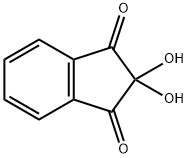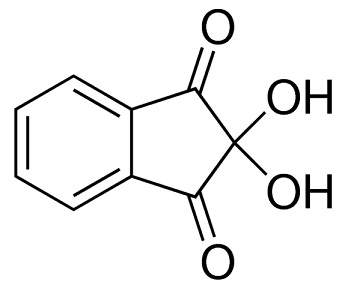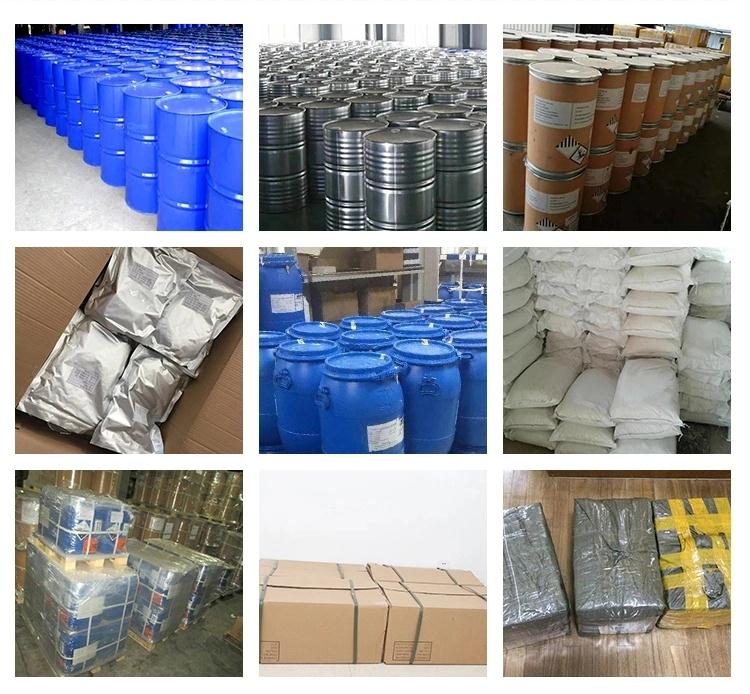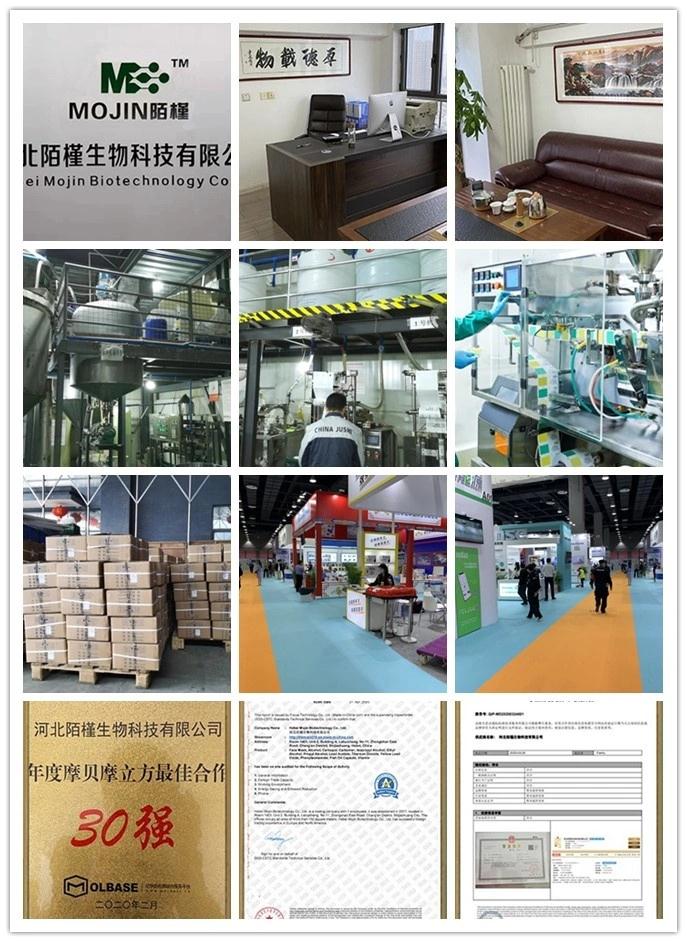| CAS: | 485-47-2 |
| MF: | C9H6O4 |
| MW: | 178.14 |
| EINECS: | 207-618-1 |
| Product Categories: | Pyridines ,Halogenated Heterocycles;Analytical Chemistry;TLC Stains;Building Blocks;C9;Carbonyl Compounds;Chemical Synthesis;Ketones;Organic Building Blocks |
| Mol File: | 485-47-2.mol |
 |
|
| Ninhydrin hydrate Chemical Properties |
| Melting point | 250 °C (dec.) (lit.) |
| Boiling point | 230.35°C (rough estimate) |
| density | 0.862 |
| vapor density | 6.16 (vs air) |
| refractive index | 1.4209 (estimate) |
| Fp | 13 °C |
| storage temp. | Keep in dark place,Inert atmosphere,Room temperature |
| solubility | Soluble in water (50 mg/ml,with sonication), ethanol (100 mg/ml), chloroform (Slightly), ether (Slightly), and methanol (100 mg/ml). |
| form | Powder/Solid |
| pka | 8.47±0.20(Predicted) |
| color | white to brownish-white, crystals |
| Specific Gravity | 0.788 |
| Odor | Odorless |
| PH | 4.6-5.0 (10g/l, H2O, 20℃) |
| PH Range | 4.6 - 5.0 |
| Water Solubility | 0.1-0.5 g/100 mL at 20 ºC |
| Sensitive | Light Sensitive |
| Merck | 14,6554 |
| BRN | 1910963 |
| Stability: | Stable. Incompatible with amines, alkalies, strong bases. Light-sensitive. |
| InChIKey | FEMOMIGRRWSMCU-UHFFFAOYSA-N |
| LogP | 0.670 |
| CAS DataBase Reference | 485-47-2(CAS DataBase Reference) |
| NIST Chemistry Reference | Ninhydrin(485-47-2) |
| EPA Substance Registry System | Ninhydrin (485-47-2) |
| Ninhydrin hydrate Usage And Synthesis |
| Description | Ninhydrin is historically the most common reagent for processing fingerprints on porous substrates. It has been used as a fingerprint reagent since the 1950s but has been used as a cell stain since the early 1900s. Ninhydrin molecules form a complex with amino acids resulting in a purple product known as Ruhmann's purple. Purple fingerprints are easily visible on light-colored porous substrates but may be difficult to see on patterned or dark-colored substrates. DFO reacts with amino acids to produce a fluorescent product that is not readily seen with the naked eye. This makes it a useful reagent on dark or patterned porous items. DFO prints are viewed with an alternate light source or laser set to 530–570 nm (green light) through a red barrier filter. 1,2-indanedione is an emerging fingerprint reagent that results in visible pink fingerprints that are also fluorescent. The fluorescence is viewed under the same conditions as DFO.
These chemicals can be used on their own or in sequence to develop latent prints on porous substrates. If they are used in sequence, they are used in the following order: indanedione, DFO, ninhydrin. If a reagent is used out of sequence, it will inhibit or limit the effectiveness of the other reagents. In this laboratory exercise you will develop fingerprints on a porous substrate using indanedione, DFO, and ninhydrin.

ninhydrin structure |
| Chemical Properties | White to pale yellow crystalline powder |
| History | Ninhydrin was discovered in 1910 by the German-English chemist Siegfried Ruhemann (1859–1943). In the same year, Ruhemann observed ninhydrin's reaction with amino acids. In 1954, Swedish investigators Oden and von Hofsten proposed that ninhydrin could be used to develop latent fingerprints. |
| Uses | Ninhydrin is an amino acid-sensitive reagent for the development of latent fingermarks on porous surfaces. More sensitive alternatives, such as DFO and IND-Zn, are now available and these have advantages on porous substrates that are not highly luminescent. However, ninhydrin can still be applied after these treatments and may reveal additional ridge detail, particularly on highly luminescent substrates where luminescence visualization may be problematic. |
| Uses | Ninhydrin is used for the detection of free amino groups in amino acids, peptides and proteins. |
| Definition | ChEBI: A member of the class of indanones that is indane-1,3-dione bearing two additional hydroxy substituents at position 2. |
| Reactions | Ninhydrin reacts with primary and secondary amines (including amino acids, proteins, and peptides) to give a dark purple product known as Ruhemann's purple (RP) . As the eccrine component of a latent mark deposit contains amino acids, this reaction can be exploited as a means of developing fingermarks on porous surfaces such as paper and cardboard. The use of ninhydrin as a fingermark detection reagent was first proposed in 1954 by Odén and von Hofsten (1954). Since then, ninhydrin has become the most popular technique for fingermark detection on porous substrates.
Eccrine glands secrete a range of different amino acids that may ultimately be present in a latent fingermark deposit (Hamilton 1965; Ramotowski 2001). Ninhydrin is a nonspecific amino acid reagent in that it reacts in the same manner with different amino acids. In this way, each amino acid present in the latent fingermark deposit will contribute to the developed fingermark image. Amino acids are stable compounds that, due to an affinity for cellulose, do not migrate to any significant extent through dry paper substrates. As a result, very old latent marks can be developed with ninhydrin (the development of 40-year-old marks has been recorded), and the revealed marks are normally of good quality. In addition, the amino acid composition of the eccrine secretion appears to remain relatively constant. Due to these qualities, the use of amino acid reagents (ninhydrin and ninhydrin analogs, including 1,8-diazafluoren-9-one [DFO]) constitutes an effective chemical technique for the development of latent fingermarks on paper surfaces. |
Packing &shipping&Payment
Packing:25kg/drum
Shipping:by sea or by air
Payment:T/T,western union,moneygram
Packaging Details drum
Port:Tianjin
Lead Time :
| Quantity(Kilograms) | 1 - 10000 | >10000 |
| Est. Time(days) | 5 | To be negotiated |

 Company information
Company information
Hebei Mojin Biotechnology Co., Ltd, Our company is a professional in 4'-Methylacetophenone,Levamisole hydrochloride ,N-Methylformamide and other chemical reagents research and development production enterprises. Our business covers more than 30 countries, most of the big customers come from Europe, America and other countries in the world, we can guarantee the quality and price. In recent decades, with the efforts of all employees, we have established many cooperative companies in shandong, henan, guangdong and other places. Our corporate purpose is based on the market, enhance the strength, take the road of scientific and environmental sustainable development, relying on the country. Technology r & d center, increase the investment in r & d, based on the domestic market, expand the international market, manufacturing quality products, sincere service to the society, into a modern, ecological, scientific and technological enterprise world.
 Advantage
Advantage
In stock
